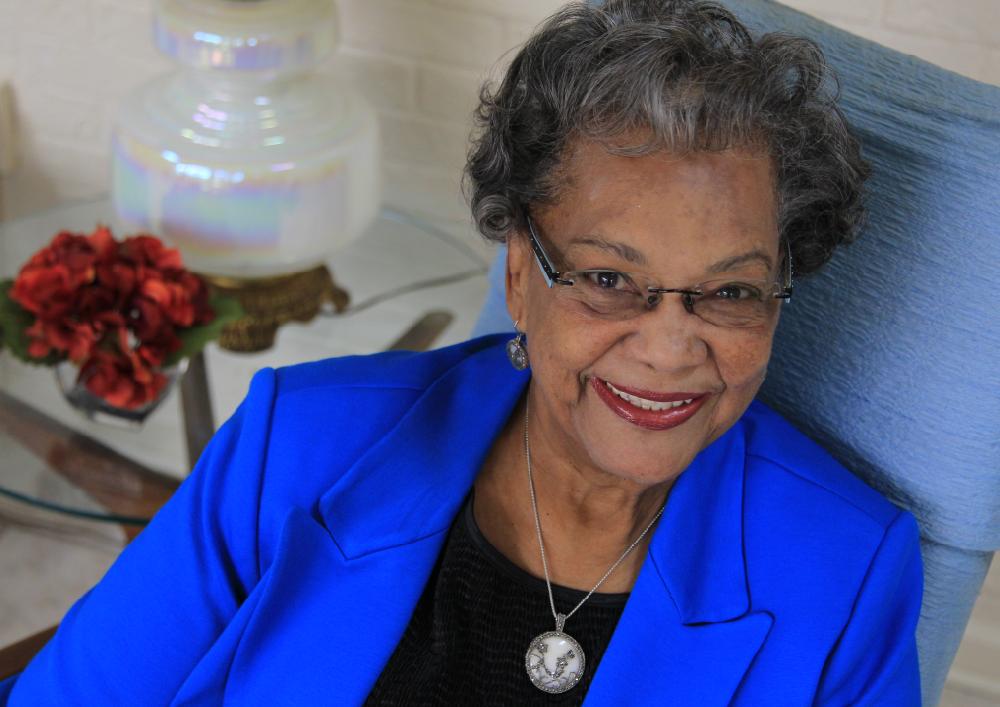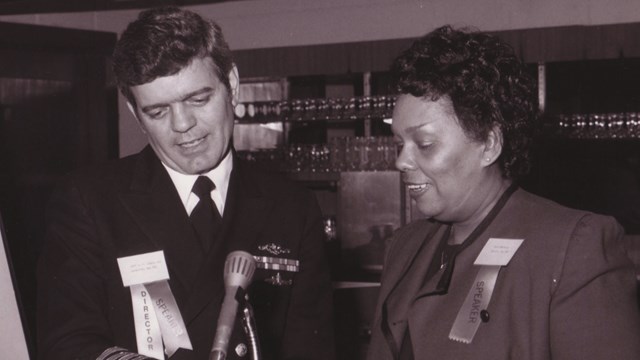 In the award-winning film, Hidden Figures, we learned the real-life story of three young Black women were instrumental in changing the course of space travel in the United States. But as we dig deeper, there are more "hidden figures" everywhere.
In the award-winning film, Hidden Figures, we learned the real-life story of three young Black women were instrumental in changing the course of space travel in the United States. But as we dig deeper, there are more "hidden figures" everywhere.
Just look at the retired engineer, Raye Montague, who single-handedly changed the way U.S. Navy ships are made and used.
Montague is credited with the rough draft of the first U.S. Naval ship design using a computer (FFG-7 Class: 1971) which revolutionized naval ship design. She became the first female Program Manager of Ships in the United States Navy.
Montague was also the first female professional engineer to receive the Society of Manufacturing Engineers Achievement Award (1978) and the National Computer Graphics Association Award for the Advancement of Computer Graphics (1988). She has also received a host of other honors from military branches, industry, and academia. Montague worked on the USS Dwight D. Eisenhower (CVN-69) and the Navy’s first landing craft helicopter-assault ship (LHA#1).
Montague passed away on October 10, 2018 at Baptist Medical Center in Little Rock, Arkansas, according to Pulaski County Coroner, the Arkansas Democrat-Gazette says.
She had suffered from congestive heart failure, but no official cause of death has been released.
Her story begins when she was a 7-year-old girl. America captured a German submarine off the coast of South Carolina. Soon after it was captured the submarine was put on tour across the country. That's when Montague saw it in Little Rock with her grandfather.
She visited the submarine and became fascinated with the vessel and asked what kind of profession a person needed to have to work in maritime vessels.
"And I looked through the periscope and saw all these dials and mechanisms and I said to the guy, 'What do you have to know to do this,'" Montague recalled. "He said, 'Oh, you'd have to be an engineer, but you don't have to worry about that.'"
While that may have been an insult, Montague took that as a challenge.
Growing up, Montague was constantly ridiculed for saying she wanted to be an engineer. Classmates would laugh and heckle her, but her 8th grade teacher, Mrs. Irma Holiday, took a liking to her and became her mentor.
"She said, 'Don't let them tease you. Aim for the stars and the very worst you'll land on the moon,'" Montague said of her long-time mentor.
Even with a college degree, Montague had to start at the bottom. Her first job was with the U.S. Navy in Washington D.C.
While working for the Navy, Montague sat next to a 1950's UNIVAC I computer. Day in and day out, she would watch and learn how Ivy League graduate engineers ran the computer. One day when the engineers all got sick, Montague jumped up and ran the UNIVAC all by herself.
"Because 'we' weren't supposed to touch that computer right? And because I was from Arkansas," said Montague of her haters.
Over the next 14 years, Montague would become so competent with computers she was transferred in 1970 to design and construct ships. It was there she was given the challenge that would change her life.

In an effort to prove that she couldn't do the job (you know how "they do"), her boss gave her a job that was nearly impossible to do--but they didn't know Montague.
"The admirals came to me and said, 'Young lady, we understand you've got a system to design ships,'" she recalled. "And they said, 'The President has given us two months, we can give you a month, can you do it?"
She did it in 18 hour and 56 minutes.
Montague revolutionized the design process for all naval ships and submarines. With each year that passed,...
... she grew in knowledge and her skills were sought after frequently with speaking engagements and awards. She received award after award from both the Navy and U.S. government. One of those awards was the U.S. Navy’s Meritorious Civilian Service Award in 1972, the Navy’s third-highest civilian award.

After being nominated for an award by the secretary of the Navy, Montague said someone threatened to kill her.
"My life was threatened. Death threats were real," Montague said. "A white man asked me not to accept the award because a white woman had not received the award. I told him I am accepting this award."
The young woman that was denied entry into the University of Arkansas found herself in places she never dreamed of.
"God sends you what you need," she said. "People put obstacles in your way. You find a way to achieve despite the system not because of the system.








